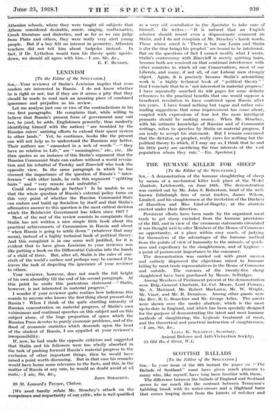LENINISM
[To the Editor of the SPECTATOR.]
Sin,—Your reviewer of Stalin's Leninism implies that your readers are interested in Russia. I do not know whether he is right or not," but if they are it seems a pity that they should be made to read such an amazing piece of combined ignorance and prejudice as his review.
Let me analyse just one or two of the contradictions in his two first paragraphs. He complains that, while willing to believe that Russia's present form of government may suit her, he (and, he adds, Englishmen generally; thus modestly identifying himself with the nation) " are troubled by the Russian rulers'. untiring efforts to extend their queer system to other lands." Yet, he continues, books like the present one will not help us to understand the Russians any better. Their authors are " enmeshed in a web of words "—" they have no relation to Life," are " meaningless," etc., etc. He then quotes as an instance of this Stalin's argument that the Russian Communist State can endure without a world revolu- tion and his rebuttal of Trotsky and Zinovieff who took the opposite view. In the same paragraph in which he has stressed the importance of the question of Russia's " inter- ference " with other lands, he calls this argument " splitting hairs " and " very remote and unfruitful." Could sheer ineptitude go • further ? Is he unable to see that the whole question of Russia's external policy turns on this very point of whether the Russian Communist State can endure and build up Soeialism by itself and that Stalin's affirmative answer to this question is the most critical decision which the Bolshevist Government has taken since 1917 ?
Most of the rest of the review consists in complaints that Stalin has not written a nice simple little book about the practical achievements of Communism in Russia and about " when Russia is going to settle down " (whatever that may mean), instead of a highly technical book of political theory: And this complaint is in one sense well justified, for it is evident that to have given Leninism to your reviewer was like putting a book on the Differential Calculus into the hands of a child of three. But, after all, Stalin is the ruler of one7 sixth of the world's surface and perhaps may be excused if he leaves the task of dispelling the ignorance of your reviewer
to others. • Your reviewer, however, does not reach the full height of his own absurdity till the end of his second paragraph. At this point he emits this portentous statement—" Stalin, however, is not interested in material progress."
I wonder if your reviewer quite realizes how ludicrous this sounds to anyone-who knows the first thing about present-day Russia ? When I think of the quite startling intensity of Russian concentration on material progress, of Stalin's own volinciinOUS and continual speeches on this subject and on thiS subject alone, of the huge proportion of space which the Russian Press devotes to purely economic problems, and of the flood- of economic statistics which descends upon the head of the student of Russia, I am appalled at your reviewer's irresponsibility.. If, now, he had made the opposite criticism and suggested that Stalin and his followers were too wholly absorbed in the task of pushing forward Russia's material progress to the exclusion of other important things, then he would have raised a point worth dismissing. But in that case his remarks would have borne some relevance to the facts, and this, in the matter -of Russia at any rate, he would no doubt avoid at all costi.I am, Sir, &e.4 [We need 'hardly refute -11fr: Strachey's: .attiiele on the. competence and impartiality of our critic, .who•is well qualified as a very old contributor to the Spectator, to take care of himself. He writes :--" It is natural that an English admirer should resent even a dispassionate comment on Stalin, and I do not complain of Mr. Strachey's harsh sirords.. Those whoSe creed is There is but one Lenin and Stalin is (for the time being) his prophet' are bound to be intolerant. But on the questions of fact I cannot modify what I wrote. Stalin's controversy with Zinovieff is merely splitting hairi, because both are resolved on that continual interference with other countries to which all our Conservatives, most of our Liberals, and many, if not all, of our Labour men strongly object. Again, it is precisely because Stalin's astonishing work is a highly technical book of " political theory " ' that I conclude that he is not interested in material progress.' I have repeatedly searched its. 450 pages for some definite references to the practical benefits that one would suppose a beneficent revolution to have conferred upon Russia after ten years. I have found nothing but vague and rather mis- leading suggestions that sonic improvement has come about,, coupled with expressions of fear lest the more intelligent peasants should be making money. When Mr. Strachey, with his intimate knowledge of Russian and of Communist writings, refers to speeches by Stalin on material progress, I am ready to accept his statement. But I remain convinced that the dictator, or prophet, really cares for nothing but the political theory to which, if I may say so, I think that he and his little party are sacrificing the true interests of the vast population whom they rule."—En. Spectator.]






























 Previous page
Previous page